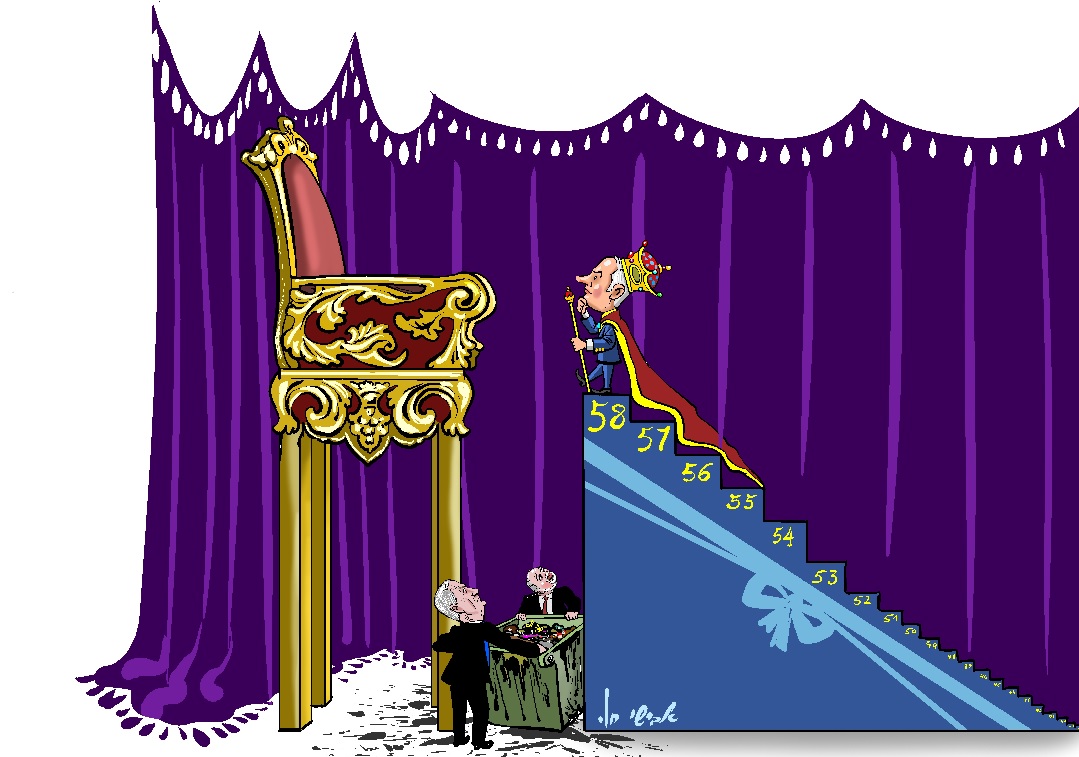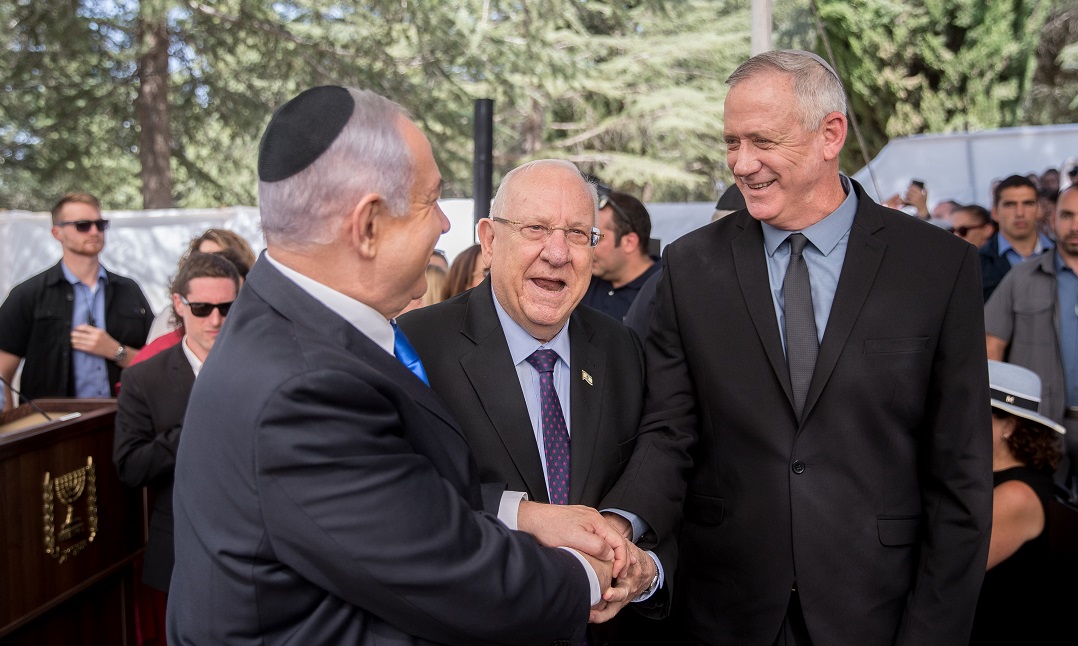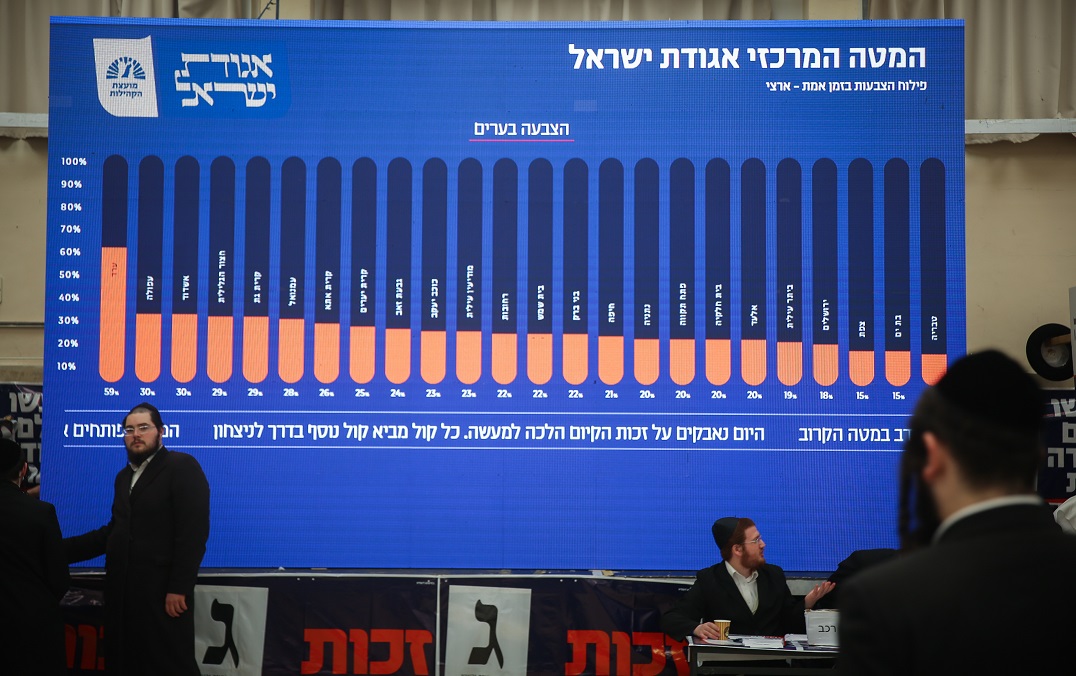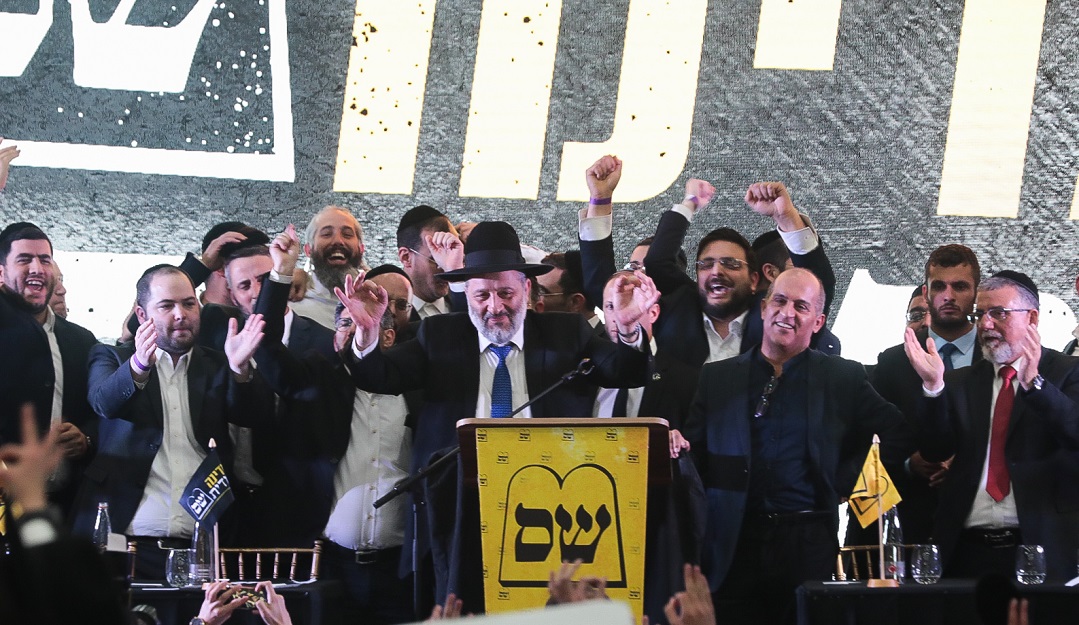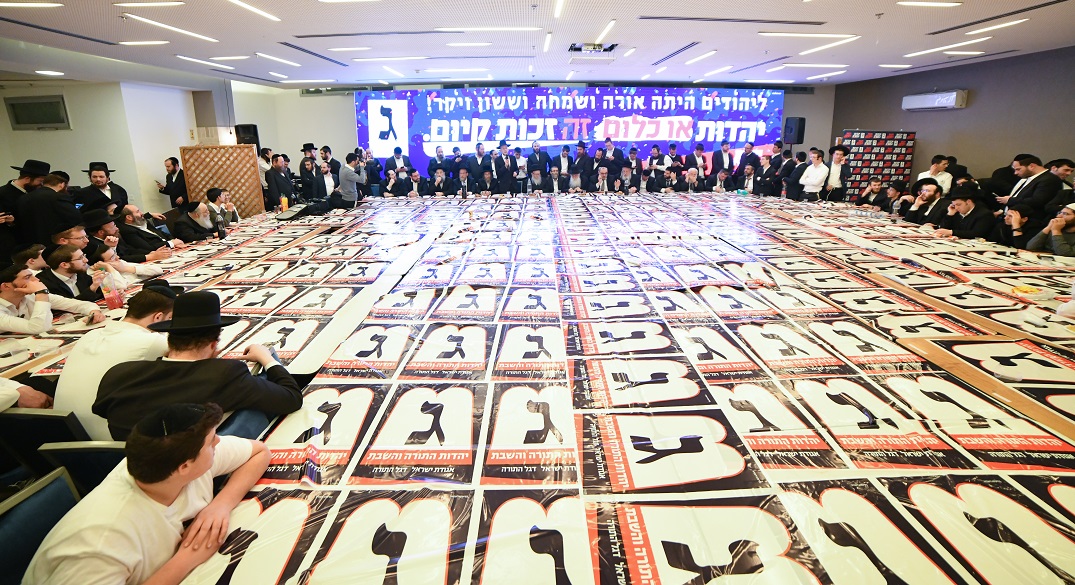Indecisive Victory
| March 5, 2020That’s it for round three: It's heartwarming to see Likud activists launch into a dance in the same place for the same person. This is how it looked from Booth 2 at the Tel Aviv Fairgrounds
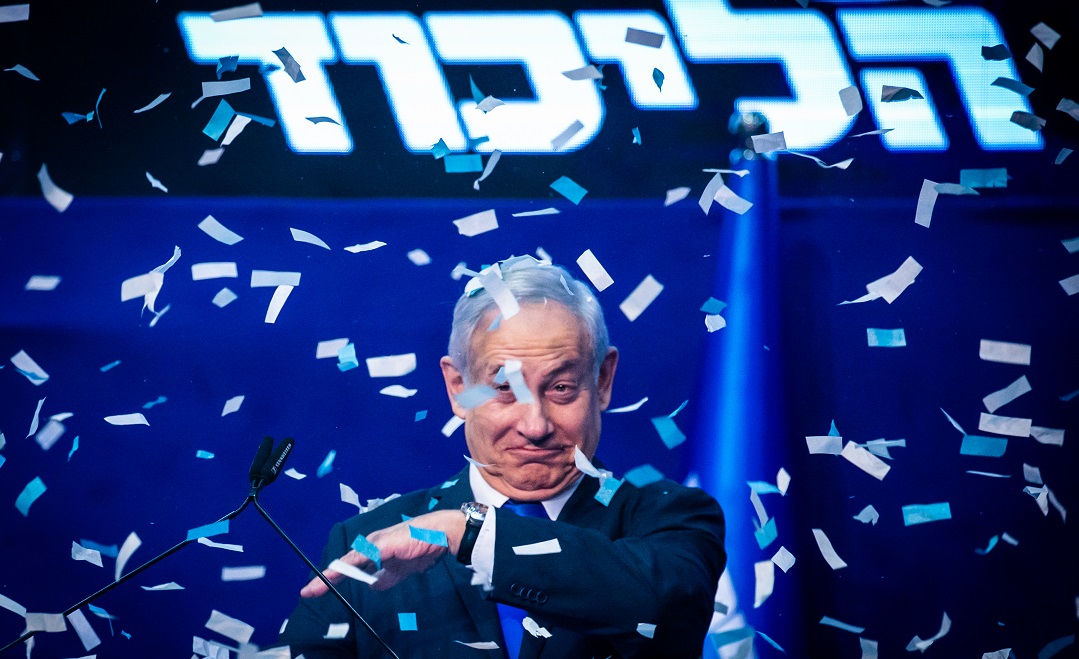
I
t’s “after elections” for the third time. A day after the polls closed, real results shed light on the mandate map, and more importantly, the bloc situation: 58 for the right wing, 55 for the left (unless there’s some dramatic surprise by a corona ballot after this writing). The right-wing bloc is three seats away from a Knesset majority. Touching distance? Zvika Hauser, Yoaz Hendel, Omer Yankelevitch and Orly Levi — might be solutions.
So there is no right-wing government, at least not on a silver platter. At the same time, it’s an exaggeration to say that the champagnes were opened too early. They needed to be opened, if only because of the high number of mandates that the Likud — and the whole bloc — received, a number that exceeded all expectations. Even the BBC reported on the early declaration of victory, noting that a “declaration of victory is an important psychological step.” But the champagne is the least agitated thing right now.
The question of all questions is which of the three possibilities the Likud will focus their efforts on to form a government: unity, minority, or defectors from the center-left to the right. A fourth election is out of the question — both declaratively and in theory. The background noises being made by the center-left carry a tone of appeasement, or at least a determination to prevent further elections, no matter the cost.
Gantz’s “We will do everything possible to replace the leadership,” clashes with Lapid’s “We won’t sit in a unity government with Netanyahu.” Based on the way it looks now, there is no way to replace the ruling party without a unity government with a rotation. Either way, the most realistic option are the defectors. Someone has to come home.
You’ve Reached Your Destination
Netanyahu is known for his publicity skills and successful campaign management. In this last election, in contrast to the previous ones, Netanyahu was on the ground talking to voters, and set a goal of bringing the boys home, so to speak, by getting 300,000 Likud voters who stayed home during the last election to go vote.
An hour before the polls closed, this Mishpacha reporter arrived at Booth 2 in the Expo hall in Tel Aviv -- where Likud activists had gathered to hear the results -- to feel out the sentiment, talk to Likudniks, get some of their insights, and most importantly, be there for the victory— or chalilah concession — speech.
I’ll reveal the end: It was a victory speech — and not of one or two elections.
9:59 PM
One minute to the first exit polls. The activists who had gathered bit their nails nervously, as though waiting for three stars to come out at the end of a fast day. Elections 2020 — Round Three, had come to an end. There was no way back. Anyone who voted, had a say. Anyone who didn’t, also did — just in a different way.
10:00 PM
There was no need to glance at my watch. The screams that set the hall shaking declared, in a slightly different language, that “ad kan hakafah gimmel. That’s it for the third round.” The results began to appear on the screens, and they were very good for one of the blocs — the right-wing bloc in this case. The huge hall suddenly felt like a cage as people paced around like leopards, not knowing how to pounce on the cut of meat set out for them. They were collectively breathing a massive sigh of relief.
“Listen, achi,” one of the people there nudged me with a hefty elbow. “Sixty mandates for the bloc, of which 37 are from Likud.” It was impossible to hear the rest of the results from him. He was already on his way to find another person to poke with his elbow and share what was in his heart.
10:10 PM
“Amir Ohana,” an alert activist howled when he saw the justice minister entering from a side door. The earlier shouts that thundered through the hall when the exit polls were broadcast were like a whisper compared to the howls that the justice minister was welcomed with. A hug with an activist, and then a friend, and he was raised onto shoulders with the music playing.
“It’s unbelievable what is happening here,” shouted one person with a knitted yarmulke who was approaching me. Truthfully, he was right. It was unbelievable. People were just walking around in circles trying to unload, to share their excitement. The Likud signs bearing the pictures of the prime minister were waved in the air; cameras were all over the place. These Likudniks — heart and soul — would not forgo their photos at this pivotal moment. Anyone with Likud blood flowing through his veins was just trying to think of how to immortalize himself against the heady backdrop of victory.
10:15 PM
The hall began to fill with activists and reporters, who came to celebrate with the tireless victor or to cover the event, respectively. The old-new prime minister had already spoken to the right-wing and chareidi party leaders, and agreed to establish a “strong government for Israel very soon.”
At the same time, the rumor began to spread that the prime minister would speak at 11:45, in an hour and a half from then. The music grew louder and faster with every veteran activist who was raised onto shoulders. “Bibi wait, let’s take pictures,” one yelled, and caused everyone to turn in that direction. A Purim mask of Binyamin Netanyahu concealed the face of the person wearing it, but that didn’t prevent dozens of people from lining up to take pictures with him. Because who cares who you really are; the main thing is that there’s another attraction to pass the time until the real thing comes.
“Gantz already tried to imitate him and failed,” one very active activist yelled at the man and his mask.
In the middle of the hall, photographers convened, capturing anyone who had something to say. And there were plenty of those. Some expounded at length, in measured voices, on the reason for the unbridled joy and what would have happened if, chalilah, it would not have been this way. Others shouted out slogans, gave regards, or formed a victory V with their fingers. Anyone observing from the side got the feeling these are not activists, they are soldiers — and not in central Tel Aviv waiting for the prime minister, but rather in Gaza, waiting to launch a ground incursion.
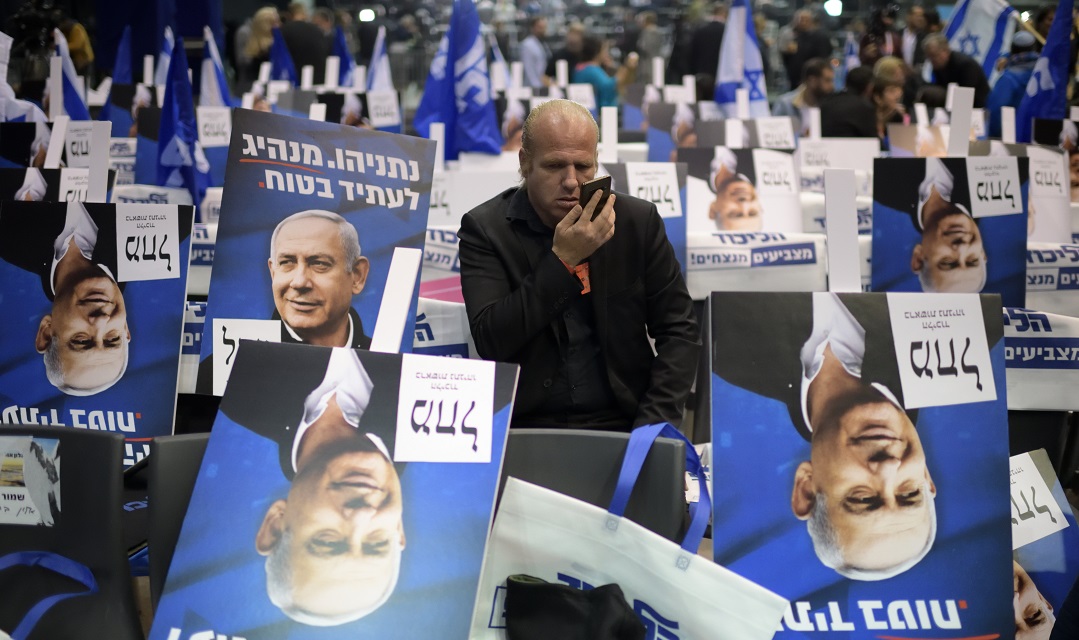
12:40 AM
“The prime minister will speak at 1:45” the message was conveyed to the media.
“It’s alright, we’ll wait as long as necessary,” one activist announced for all of them. “We’ve been through three election cycles; can’t we wait another hour?” he claimed logically.
Someone in production remembered that Purim is almost here. The music began to play “Mishenichnas Adar,” with the activists singing along. “LaYehudim Haytah Orah V’simchah,” seemed to have been composed for this event. By the time the music switched to “V’nahafoch Hu,” the crowd lost it. Full disclosure: This is the first time that I made the brachah of Hatov Vehametiv on the fact that they didn’t bring out any wine.
“Are there Bukharians here?” the keyboard player hollered. The songs switched rapidly from one to another, with different styles and tempos. The Yemenite “Abba Shimon” followed by “Ahalan Vesahalan Ahalan Bikum” from Morocco, followed by “Anachnu Ma’aminim Bnei Ma’aminim” from the chassidic music genre.
Because in families, there is room for everyone. You need to want to include everyone.
1:30 AM
Masses of people pressed against the gates separating the loyal soldiers and their venerated general who was about to enter the hall to cheers and trumpets. The ebullient winners gripped the metal barriers with all their might and stood at attention. It was impossible to be at ease, so to speak, as it grew more crowded by the minute.
Those who couldn’t reach the gate climbed onto chairs, and those behind them needed to stand on two chairs. “Did you see the parenches that they made here?” the man with the small yarmulke whispered-shouted at me as his glasses slid down his nose. “My grandfather was a Vizhnitzer chassid,” he explained hastily.
“The prime minister’s motorcade is leaving Jerusalem now,” the news thrummed through the room, jacking up the adrenaline. “Hu-ha mi zeh ba, rosh hamemshalah ba,” the younger ones could not help but cheer.
2:05 AM
“The prime minister’s speech is in ten minutes.”
Anyone who thought that the expectation and admiration would be replaced with grumbles or anger was badly mistaken. The loud music had charged all the batteries that were wearing down from standing for hours. Here and there, you could see some heads down or palms covering faces. But that’s a long way away from complaining. Of course, when talking about loyal activists, especially Likud ones, and even more so when they are waiting for the “father of the nation, a prime minister like we haven’t had in the 70 years of the State of Israel’s existence.”
The Likud MKs and ministers got a performance all for themselves. The princes walked in one after another near the gate, shaking hands, high-fiving and stopping to take pictures, hug supporters, and kibitz. If it was up to the Likud activists, the portfolios for the next government would have been assigned by now. “Hu-ha mi zeh ba — sar hamishpatim haba,” they cried to Amir Ohana, who is already serving as justice minister. The new portfolios were distributed to Galant and Barkat. “Hu-ha mi zeh ba sar habitachon haba,” they cried at Galant. “Sar ha’otzar haba” — at Barkat.
And then, he arrived.
2:15 AM
“Thank you very much. Thank you thank you thank you,” the prime minister managed to get in a few words between the cheers of “Heida Bibi” and “Hu Kosem (He’s a magician).” “I love you all. It’s to your credit that we are here,” he continued in the same vein. When the frenzied activists took their first breath, the prime minister began thanking all those who had played even a marginal role in the campaign, the ministers at his side, the energetic activists and staff, and anyone he may have forgotten. He left the thank you to his wife Sara for the end, when he announced that it was their anniversary the next day. “Did you like the dogs?” Netanyahu asked playfully. He was referring to a video clip in which he is depicted doing everything so that everyone could actualize their right to vote, even if it meant watching someone’s dogs so he could go out. Democracy at its best. He did not even ask first if the man votes Likud.
Netanyahu was very excited. This was a man who has won quite a number of elections, who has met world leaders, who has earned the respect of the American and Russian presidents, who has Muslim leaders trying to reach out to him, who has led Israel to unprecedented achievements — this is the man who now broke down in front of the Likud activists screaming their hearts out in front of him. He got choked up when he spoke of his sons Avner and Yair — who were in the hall, and “what you need to go through because of me.” He could hardly continue when mentioning his parents, Benzion and Tzila z”l, from whom he imbibed values and life experience.
From the Doldrums to a Turnabout
“With a joint effort we overturned the whole thing, we made lemonade out of the lemons,” Netanyahu declared. “Israel’s citizens gave us their trust. Do you know why? Because they know we have given them the best decade that this country has ever had.”
Netanyahu went on to detail the many achievements in lots of areas, the change of Israel’s status in the world and its evolvement into a world power, as well as the global ties he has forged. He did not forget “our brothers and sisters in the Ethiopian community who returned home — to the Likud,” and MK Gadi Yevarkan stood up to whistles and cheers and waved. Then it came time for the vision, the goal that the prime minister has set for the coming years, which he concluded with a pledge: “We will do this all. It is a mission and it is the goal of my life to guarantee the future of the State of Israel for generations.” It includes: imposing sovereignty on Yehuda, Shomron, and the Jordan Valley; quashing the Iranian threat; forging peaceful ties with Arab and Muslim nations; implementing major economic reforms to lower the cost of living; and forging a historic defense pact with the United States. “I’ve begun discussing it with President Trump,” he announced.
“After we sleep a bit,” Netanyahu continued, “we’ll convene all the faction leaders in the right-wing camp, our natural partners, in order to form a strong, stable government very soon, a national government that is good for Israel.” Netanyahu paused for a minute to take a drink, but he had a hard time getting back into the speech.
Calls of “We don’t want unity” competed with “Blue and White is Haniyeh [Hamas leader].” Netanyahu, understanding his activists as always, let them unload their fury into the hall. When the heckling died down, Netanyahu added a sentence that could have reignited their adrenaline: “I intend to be the prime minister of all of Israel’s citizens, with no exceptions. Right-wing voters, left-wing voters, Jews and non-Jews from all the sectors.” Surprisingly enough — the fire calmed down.
“The time has come to stop with these elections and form a government. The time has come to heal the rifts; the time for reconciliation has come,” Netanyahu said. In response he got calls of “You’ll never be alone” and “Mandelblit go home.” He had clearly come prepared. Netanyahu did not get excited; he didn’t blush or smile. He just made his hand into a stop sign and continued his speech, as if no one had reminded him that the way to a government has to pass through the High Court.
3:00 AM
The speech came to an end. The activists barely dragged themselves home, tired but happy. The prime minister left the stage, knowing that he still has a long road to swearing in a government and that even the police and GSS vehicles gathered outside could do little to help him. He realizes that the battle might be over, but the war has just begun.
The right-wing bloc that supports him can be the foundation of the next Netanyahu government, but it might also pose a major obstacle to Trump’s Deal of the Century, which Netanyahu is eager to advance.
Night was fading into dawn. I thought about taking advantage of the MKs’ cheerful frame of mind and the many smiles to ask them to pass just one small law — tiny but very needed: a day off on the day after elections.
(Mishpacha.com)
Oops! We could not locate your form.







